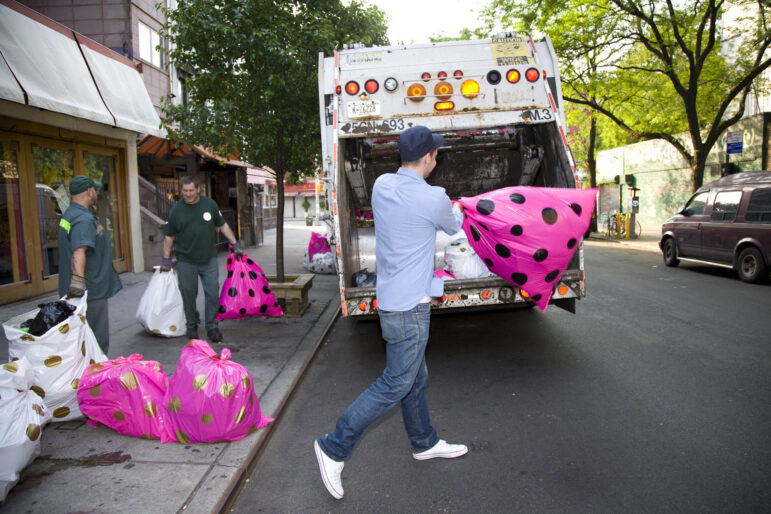
Photo by: National Cancer Institute
It’s time for New York City to transform itself from a laughing stock to a national leader on food and hunger issues.
The city’s food status quo fosters hunger, obesity, poverty and environmental degradation. Fully 1.4 million city residents—including nearly half a million children—live in homes so low-income that they don’t always know where their next meal is coming from. That means one in six New Yorkers and one in five of the city’s children struggle against hunger, and because healthy food is often more expensive, often have higher risks of obesity.
Of 26 big cities nationwide, New York ranks dead last in school breakfast participation, even though such meals are federally-funded. Jobs in the food industry often pay poverty wages, and many local jobs are lost entirely because food is processed elsewhere. Yet, instead of dealing with the serious issues of poverty, hunger, and economic under-development, the city chose instead to be the butt of late-night jokes by trying to micro-manage beverage sizes.
It’s time for the city to get serious about food.
That’s why the New York City Coalition Against hunger just released a report, Food Secure NYC 2018, which gives the next mayor a very specific plan to end hunger and ensure access to nutritious, affordable, and convenient food for all New Yorkers through a revamped food system that creates jobs, aids workers, bolsters businesses, and protects the environment. The plan is designed to be completely implemented by 2018, the end of the next mayor’s first term.
The next mayor of New York City should lead an effort—in conjunction with the City Council and other local elected officials, the state and federal governments, the non-profit sector, the business community, and civil society—to dramatically transform the city’s broken food system by 2018. This bold, but realistic, plan is not only cost-effective, it provides specific steps and executive actions the next mayor can take to end hunger across all five boroughs of the city.
Our goal should be a model for the nation that ensures that all city residents have access to sufficient, affordable, nutritious food produced in a manner that not only protects the environment, but also boosts economic opportunity for both workers and investors.
Food Secure NYC 2018 provides concrete steps to achieve a city where everyone has enough to eat as a result of a strengthened economy and food system. (The full report, as well as an appendix recommending legislative action at the federal, state, and city levels, are available here.) The Big Apple leads the nation in entertainment, culture, and finance—the time is long overdue for us to also lead the nation in feeding our own residents.
To give just one specific example, the plan suggests that the next mayor launch a comprehensive “Good Food, Good Jobs” initiative to capture more of the $30 billion spent by NYC residents, annually, on food by taking the following steps:
We can provide more and better-targeted seed money to food jobs projects. The city government should expand, and more carefully target, its existing grants and loans to start new, and expand existing, community food projects such as city and rooftop gardens; urban farms; food co-ops; farm stands; community-supported agriculture (CSA) projects; farmers’ markets; community kitchens; and projects that hire unemployed youth to grow, market, sell, and deliver nutritious foods while teaching them entrepreneurial skills.
We can also bolster food processing and expand community-based technical assistance
since there is sometimes more profit in processing food than in simply growing it (and since farming is only a seasonal occupation), the initiative should focus on supporting food businesses that add value year-round, such as neighborhood food processing/freezing/canning plants. Federal, state, and local governments should dramatically expand technical assistance to such efforts and support them by buying their products for school meals and other government nutrition assistance programs, as well as for jails, military facilities, hospitals, and concession stands in public parks, among other venues.
We can also invest in less traditional products and food sources such as urban aquaculture and kosher products. Both of these areas generate significant revenue each year, with world fishing imports reaching $113 billion in 2010.
There are currently far too many bureaucratic burdens on food-related small businesses. The city should pilot a new fine-reduction program to cut fines, pilot community districts, ensure inspectors focus on increasing compliance through education, direct outreach and provide businesses with an opportunity to correct non-critical violations before receiving a fine. The adjudication process should also be streamlined.
To achieve all of the goals outlined in the Food Secure NYC 2018 initiative we will build a grassroots, non-partisan movement in all five boroughs with the power to change the public conversation and knowledge of hunger, nutrition, food, and poverty issues. The movement will deliver a clear, concrete, consistent, and compelling message to the broad public about the causes of, and solutions to, local hunger and food problems. It will also educate elected officials and other sectors on concrete steps they should take to eventually end local hunger, mostly with already-existing federal programs.
Building on this movement, the next mayor has an historic opportunity to make New York City the nation’s true leader on food issues.









